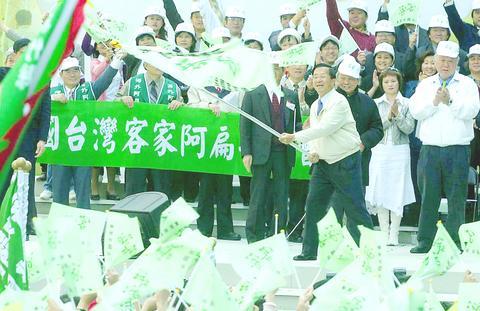With the completion of the first televised presidential debate on Saturday, both the Democratic Progressive Party (DPP) and Chinese Nationalist Party (KMT) said there is much room for their respective candidates to improve in the next debate, scheduled for next Saturday afternoon.
Chen Chun-lin (
Chen Chun-lin said that since the DPP has been the subject of verbal attacks by the rival camp of the KMT-People First Party (PFP) alliance, Chen Shui-bian's attacks on KMT Chairman Lien Chan (連戰) during the debate showed a prompt and appropriate counter-offensive.

PHOTO: CHIANG YING-YING, TAIPEI TIMES
"However, because Chen always wears a smile while saying those acidic words to Lien, it also demonstrated Chen's good demeanor and his sincerity for reforms," Chen Chun-lin said.
As for the strategy for the second debate, Chen Chun-lin said the president will need to maintain his performance level while focussing more on detailing the country's future, which was largely ignored by both candidates on Saturday.
Policies needing debate include the five-year, NT$500 billion public construction project, the election-day referendum, a nine-member task force to promote Chen Shui-bian's peace and stability framework for cross-strait interaction, economic and financial reforms, the reduction in the number of legislative seats and political donations.

PHOTO: CHIANG YING-YING, TAIPEI TIMES
Meanwhile, the DPP said yesterday that Chen Shui-bian hopes the panelists in the second debate can be replaced by media representatives instead of the academics and pundits who asked questions in the first debate.
Lien's performance was seen as weak in last Saturday's debate.
KMT Legislator Yu Tzu-shiang (游梓翔), who also serves as a campaign aide for the pan-blue camp, said that it had not been the KMT-PFP alliance's intention to highlight Lien's offensive capabilities.
"What we aimed for in the debate was for Lien to exude his leadership gravitas -- stable and calm -- and his usual image as an individual of steadiness with substantive insights," Yu said.
Yu acknowledged, however, that Lien might work to improve his attacks for the final televised debate.
Another issue members of the blue camp felt needed to be reviewed was the selection of questions Lien would put to Chen.
Some felt that Lien's questions during Saturday's debate were not sharp enough to pin down Chen, and instead gave Chen room to strike back and paint Lien with a pro-China brush.
When Lien asked Chen for proof of his accusation that he was being manipulated by China, Chen came back and cited the fact that Chang Yang (
Chen threw the question back at Lien, questioning how Chang was able to run the office without the support of the Chinese government.
Stating that steadiness and calmness are needed to take on the nation's top job, alliance spokesman Alex Tsai (蔡正元) expressed confidence that the KMT chief would do a better job in the next debate.
"Lien is known for being scrupulous," Tsai said. "In preparation for being the national leader in the foreseeable future, Lien will this week attempt to present a blueprint of his national policies and ideals to the people of Taiwan in the second televised debate."

Chinese Nationalist Party (KMT) Chairman Eric Chu (朱立倫), spokeswoman Yang Chih-yu (楊智伃) and Legislator Hsieh Lung-chieh (謝龍介) would be summoned by police for questioning for leading an illegal assembly on Thursday evening last week, Minister of the Interior Liu Shyh-fang (劉世芳) said today. The three KMT officials led an assembly outside the Taipei City Prosecutors’ Office, a restricted area where public assembly is not allowed, protesting the questioning of several KMT staff and searches of KMT headquarters and offices in a recall petition forgery case. Chu, Yang and Hsieh are all suspected of contravening the Assembly and Parade Act (集會遊行法) by holding

PRAISE: Japanese visitor Takashi Kubota said the Taiwanese temple architecture images showcased in the AI Art Gallery were the most impressive displays he saw Taiwan does not have an official pavilion at the World Expo in Osaka, Japan, because of its diplomatic predicament, but the government-backed Tech World pavilion is drawing interest with its unique recreations of works by Taiwanese artists. The pavilion features an artificial intelligence (AI)-based art gallery showcasing works of famous Taiwanese artists from the Japanese colonial period using innovative technologies. Among its main simulated displays are Eastern gouache paintings by Chen Chin (陳進), Lin Yu-shan (林玉山) and Kuo Hsueh-hu (郭雪湖), who were the three young Taiwanese painters selected for the East Asian Painting exhibition in 1927. Gouache is a water-based

Taiwan would welcome the return of Honduras as a diplomatic ally if its next president decides to make such a move, Minister of Foreign Affairs Lin Chia-lung (林佳龍) said yesterday. “Of course, we would welcome Honduras if they want to restore diplomatic ties with Taiwan after their elections,” Lin said at a meeting of the legislature’s Foreign Affairs and National Defense Committee, when asked to comment on statements made by two of the three Honduran presidential candidates during the presidential campaign in the Central American country. Taiwan is paying close attention to the region as a whole in the wake of a

OFF-TARGET: More than 30,000 participants were expected to take part in the Games next month, but only 6,550 foreign and 19,400 Taiwanese athletes have registered Taipei city councilors yesterday blasted the organizers of next month’s World Masters Games over sudden timetable and venue changes, which they said have caused thousands of participants to back out of the international sporting event, among other organizational issues. They also cited visa delays and political interference by China as reasons many foreign athletes are requesting refunds for the event, to be held from May 17 to 30. Jointly organized by the Taipei and New Taipei City governments, the games have been rocked by numerous controversies since preparations began in 2020. Taipei City Councilor Lin Yen-feng (林延鳳) said yesterday that new measures by